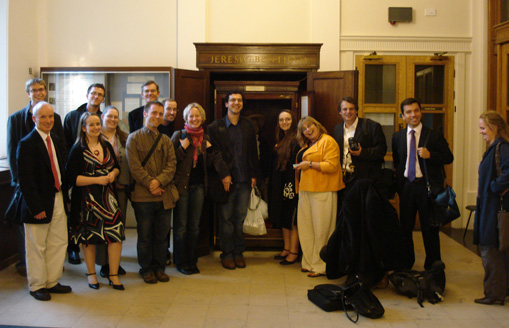
Some readers may remember my previous comments about a dubious advertising campaign from Virgin Mobile Australia. Some of the pictures were clearly bordering on the defamatory, so it should come as no surprise that Virgin has been sued by one of the victims. However, what may prove truly surprising is that the list of defendants includes Creative Commons.
 The background of the case is quite typical of the user-generated webspace. Sometime in April this year, Justin Ho-Wee Wong took a picture featuring American teenager Alison Chang and placed it on his Flickr stream and released under a Creative Commons Attribution licence (the picture has now been removed from Flickr). There are millions of such pictures online, but this one was picked up by Virgin Australia's advertising agency and was included in Virgin's now infamous "Are you with us or what?" ad campaign (find more pictures here), with the caption "Dump your Pen Friend". The ad was photographed by sesh00 in a bus stop in Adelaide, and then posted with a comment in Flickr. Alison found to her surprise that she was in the picture, commenting "hey that's me! no joke. i think i'm being insulted...can you tell me where this was taken." The ensuing discussion will elucidate on the roots behind the current suit, but also may serve as a reminder of the complexities of legal issues in the Web 2.0 era. The end result is that the family sought legal advice, and they have finally sued in a Dallas County District Court. The complaints against Virgin Mobile are for invasion of privacy, libel, and breach of contract; while the claim against Creative commons is for negligence.
The background of the case is quite typical of the user-generated webspace. Sometime in April this year, Justin Ho-Wee Wong took a picture featuring American teenager Alison Chang and placed it on his Flickr stream and released under a Creative Commons Attribution licence (the picture has now been removed from Flickr). There are millions of such pictures online, but this one was picked up by Virgin Australia's advertising agency and was included in Virgin's now infamous "Are you with us or what?" ad campaign (find more pictures here), with the caption "Dump your Pen Friend". The ad was photographed by sesh00 in a bus stop in Adelaide, and then posted with a comment in Flickr. Alison found to her surprise that she was in the picture, commenting "hey that's me! no joke. i think i'm being insulted...can you tell me where this was taken." The ensuing discussion will elucidate on the roots behind the current suit, but also may serve as a reminder of the complexities of legal issues in the Web 2.0 era. The end result is that the family sought legal advice, and they have finally sued in a Dallas County District Court. The complaints against Virgin Mobile are for invasion of privacy, libel, and breach of contract; while the claim against Creative commons is for negligence.
Some people may ask what is the big brouhaha about this picture and why would the family feel insulted. I must admit that there is something indeed sinister about the entire campaign, and I also share some people's idea that the caption is rather racist. Jenn at Reappropriate blog has made a very shrewd analysis of what is wrong with the picture, the caption seems to be playing with the racial stereotype of the geeky Asian pen pal girl, when in fact this is a typical American teenager pictured by her friend. Some of the earlier Mainstream Media reports also seemed to assume that the suit was prompted by the smaller caption "Free Text Virgin to Virgin", which seems to have some sexual connotations.
I have no idea whatsoever about some of the personality rights and the potential privacy issues according to Texas and Australian law, so I will not comment on Virgin's potential liability in those terms. However, I will just say that it was just a matter of time until they got sued by one of the people depicted in the campaign, I mean, what were they thinking? I will point out that some advertisers, photographers and people in the know have commented on the fact that this image had no model release form, and that the advertising agency should have known better. The fact that the picture was released under a Creative Commons does not change the fact that there was a person involved, and that the subject should have been treated as any model. The Attribution CC licence allows commercial use, but it does not exempt Virgin from its derogatory use of the people involved in the image. Creative Commons licences deal with copyright, and any other rights involved have to be dealt with separately.
The marriage between digital photography and the Internet have heralded an era where countless pictures are posted everywhere online. We all take photographs and post them in blogs, Facebook and Flickr. Should we be walking around with model release forms in order to avoid litigation? Clearly not! Most people live their lives assuming that taking a picture and posting it online is just one of the facts of the networked era. However, this case should continue to highlight the fact that there are potentially sensible images out there, including drunken debauchery on Facebook, or a blog post taken out of context, and that we should therefore exercise caution.
What about Creative Commons' involvement? The negligence claim against the organisation reads:
"Creative Commons owed a duty to Justin Wong, as a user and beneficiary of its license. Creative Commons breached this duty by failing, among other things, to adequately educate and warn him, as a user of the Creative Commons Atribution license, to warn him of the meaning of commercial use and the ramifications and effects of entering into a license allowing such use."
I believe that this is a preposterous claim, but one that is shared by some. Since the earlier
Flickr discussion about the Virgin campaign, and from the debate taking place with regards to this particular image, it is clear that there appears to be a backlash against Creative Commons. Some people have wondered if it is best to revert to "All Rights Reserved", which I notice has been done by Mr Wong to his extensive online picture collection. The problem is that Creative Commons goes out of its way to educate the public and to explain the issues in understandable terms via pictures, comics, videos and by the existence of the human-readable Commons Deed. Similarly, all licences contain the following disclaimer:
"Creative Commons is not a party to this Licence, and makes no warranty whatsoever in connection with the Work. Creative Commons will not be liable to You or any party on any legal theory for any damages whatsoever, including without limitation any general, special, incidental or consequential damages arising in connection to this licence. Notwithstanding the foregoing two (2) sentences, if Creative Commons has expressly identified itself as the Licensor hereunder, it shall have all rights and obligations of Licensor."
It may seem as a typical legal cop-out, but it is an important point. Creative Commons is not party to any agreement, its duties are fulfilled by offering pre-drafted licences to the public. In my opinion, its duties are more than adequately fulfilled by the
various channels of public information available to licensors.
Larry Lessig has commented on the case already, and I find his arguments sound. I cannot see how a court would find CC liable for negligence in this instance, and I believe strongly that CC's involvement will be thrown out early into the litigation. Virgin's involvement however is more serious. Their nasty campaign has come back to haunt them, and it seems like they know it; when you visit Virgin's "
Are you with us or what?" website, all you get is a logo, and the offending images have been removed.
Whatever the result, this story has legs. It has been picked up by the
blogosphere and the
mainstream press, and I'm afraid that CC opponents will be delighted by these developments.
On a personal note, this encourages me to finish my article on CC enforcement and contract formation issues. I notice again that this case deals with the licences in contractual terms.

 del.icio.us
del.icio.us










